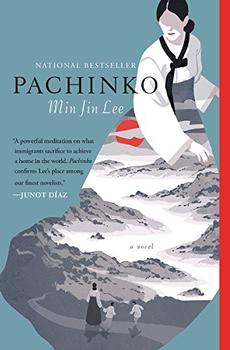Summary | Excerpt | Reading Guide | Reviews | Beyond the Book | Readalikes | Genres & Themes | Author Bio

Chapter 1
Yeongdo, Busan, Korea
History has failed us, but no matter.
At the turn of the century, an aging fisherman and his wife decided to
take in lodgers for extra money. Both were born and raised in the fishing village of Yeongdo—a five-mile-wide islet beside the port city of Busan. In their long marriage, the wife gave birth to three sons, but only Hoonie, the eldest and the weakest one, survived. Hoonie was born with a cleft palate and a twisted foot; he was, however, endowed with hefty shoulders, a squat build, and a golden complexion. Even as a young man, he retained the mild, thoughtful temperament he'd had as a child. When Hoonie covered his misshapen mouth with his hands, something he did out of habit meeting strangers, he resembled his nice-looking father, both having the same large, smiling eyes. Inky eyebrows graced his broad forehead, perpetually tanned from outdoor work. Like his parents, Hoonie was not a nimble talker, and some made the mistake of thinking that because he could not speak quickly there was something wrong with his mind, but that was not true.
In 1910, when Hoonie was twenty-seven years old, Japan annexed Korea. The fisherman and his wife, thrifty and hardy peasants, refused to be distracted by the country's incompetent aristocrats and corrupt rulers, who had lost their nation to thieves. When the rent for their house was raised again, the couple moved out of their bedroom and slept in the anteroom near the kitchen to increase the number of lodgers.
The wooden house they had rented for over three decades was not large, just shy of five hundred square feet. Sliding paper doors divided the interior into three snug rooms, and the fisherman himself had replaced its leaky grass roof with reddish clay tiles to the benefit of his landlord, who lived in splendor in a mansion in Busan. Eventually, the kitchen was pushed out to the vegetable garden to make way for the larger cooking pots and the growing number of portable dining tables that hung on pegs along the mortared stone wall.
At his father's insistence, Hoonie learned to read and write Korean and Japanese from the village schoolmaster well enough to keep a boardinghouse ledger and to do sums in his head so he couldn't be cheated at the market. When he knew how to do this, his parents pulled him out of school. As an adolescent, Hoonie worked nearly as well as a strong man twice his age with two well-shaped legs; he was dexterous with his hands and could carry heavy loads, but he could not run or walk quickly. Both Hoonie and his father were known in the village for never picking up a cup of wine. The fisherman and his wife raised their surviving son, the neighborhood cripple, to be clever and diligent, because they did not know who would care for him after they died.
If it were possible for a man and his wife to share one heart, Hoonie was this steady, beating organ. They had lost their other sons—the youngest to measles and the middle, good-for-nothing one to a goring bull in a pointless accident. Except for school and the market, the old couple kept young Hoonie close by the house, and eventually, as a young man, Hoonie needed to stay home to help his parents. They could not bear to disappoint him; yet they loved him enough not to dote on him. The peasants knew that a spoiled son did more harm to a family than a dead one, and they kept themselves from indulging him too much.
Other families in the land were not so fortunate as to have two such sensible parents, and as happens in countries being pillaged by rivals or nature, the weak—the elderly, widows and orphans—were as desperate as ever on the colonized peninsula. For any household that could feed one more, there were multitudes willing to work a full day for a bowl of barley rice.
In the spring of 1911, two weeks after Hoonie turned twenty-eight, the red-cheeked matchmaker from town called on his mother.
Excerpted from Pachinko by Min Jin Lee. Copyright © 2017 by Min Jin Lee. Excerpted by permission of Grand Central Publishing. All rights reserved. No part of this excerpt may be reproduced or reprinted without permission in writing from the publisher.
Your guide toexceptional books
BookBrowse seeks out and recommends the best in contemporary fiction and nonfiction—books that not only engage and entertain but also deepen our understanding of ourselves and the world around us.